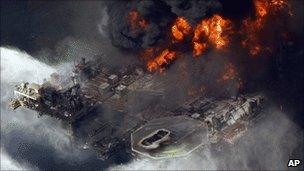UK deep sea oil spill response plans questioned by MPs
- Published

The Deepwater Horizon rig explosion led to the worst environmental catastrophe in US history
A committee of MPs has raised "serious doubts" about the UK's ability to combat oil spills from deep sea rigs following the BP Gulf of Mexico oil disaster last year.
They also warned that taxpayers could pay for a major spill in the North Sea.
But they said a moratorium on deep sea drilling would undermine the UK's energy security and is unnecessary.
Energy Minister Charles Hendry "welcomed" the report and said he would consider its recommendations in detail.
The report came as a US presidential commission found that decisions to cut costs and save time had contributed to last year's BP spill in the Gulf of Mexico.
It added that the failures were "systemic" and likely to recur without industry and government reform.
'Intimidation'
In the UK report, MPs singled out the "harsh conditions" off the west coast of the Shetland Islands in Scotland, where oil wells are being drilled more than 1,000 metres deep.
There were "serious doubts" about the ability of clean-up equipment to function in such an environment, it added.
Committee chairman Tim Yeo said: "The harsh and windy conditions in the North Sea would make an oil spill off the coast of Shetland very difficult to contain or clean up".
David Shukman with the "top hats" used by BP to help seal oil leaks
The report also warned that a lack of clarity surrounding liability rules in the UK "could see taxpayers pick up the tab for a major oil spill in the North Sea".
And Mr Yeo questioned the response plans currently in place at oil exploration firms, saying that these must be site-specific and not generic.
"Companies cannot continue producing cut and paste oil spill response plans and rig operators must make it easier for staff to raise concerns without fear of intimidation," he said.
The MPs said the commercial pressures to keep on drilling were so great that workers who drew attention to safety problems "may be - or feel - intimidated by their managers".
They also noted contradictions in Health and Safety Executive reports about bullying and harassment on oil rigs.
Mixed response
Mr Hendry said the government welcomed the committee's "thorough and comprehensive report".
"We note in particular that the committee supports the government's view that a moratorium on UK deepwater drilling is not warranted."
Industry body Oil & Gas UK also welcomed the report's finding that a moratorium was unnecessary.
"We also warmly welcome the committee's utter rejection of calls for increased regulatory oversight from the European Commission," added the group's chief executive Malcolm Webb.
He told the BBC that the industry had made "gigantic strides" in being prepared for an accident - and that the UK now had the equipment to cap a well.
And addressing the concerns of the report about firms' ability to deal with problems off the Scottish coast, he added: "The industry is working to develop a capping device which can be deployed in the rough waters west of Shetland."
Mr Webb also questioned the concerns of MPs over whether oil firms would be able to afford the clean up operations in the event of a spill - saying that it was clear companies were liable to cover costs, meaning that taxpayers or the government would not lose out.
"The regulator has all the powers to ensure that the oil companies are carrying all the requisite insurance," he added.
However, the report was not universally praised.
Greenpeace executive director John Sauven said: "This report lists all the reasons why a ban on deep sea drilling makes sense and then ignores its own findings".
"The oil companies have no idea how they would deal with a major spill off the coast of the UK but apparently we're supposed to trust them until they come up with an adequate plan."
The MPs' report is a response to the Deepwater Horizon drilling rig explosion in the Gulf of Mexico in April last year - that blast killed 11 workers and spilled millions of barrels of oil over several months.
The oil leak became one of the worst oil spills in history.